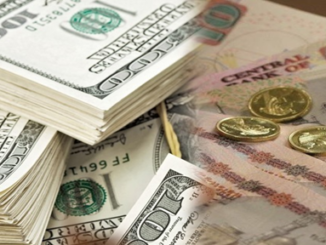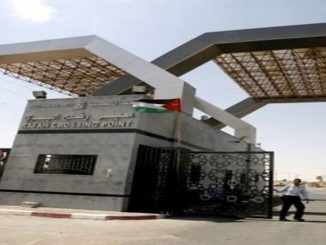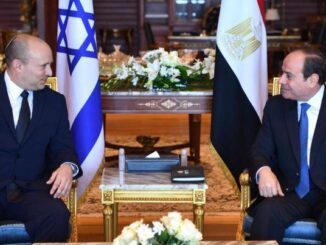
While world leaders are heading to Sharm El-Sheikh to attend the UN COP27, “Cairo is turning to the IMF as its economy falters”, states FP in a report.
“Egypt’s currency hit record lows against the U.S. dollar last week after the Central Bank of Egypt implemented a flexible exchange rate to secure a $3 billion loan with the International Monetary Fund (IMF). The Egyptian pound fell to 24 pounds against the dollar for the first time, with analysts predicting a further depreciation,” according to a Foreign Policy report.
In her report, Nosmot Gbadamosi, a multimedia journalist and writer of Foreign Policy’s weekly Africa Brief, said, “As Egypt prepares to welcome global leaders next week as the host of the 27th United Nations Climate Change Conference, or COP27, the country’s beleaguered economy is faltering, having been battered by the COVID-19 pandemic and then commodity price shocks following the Russian invasion of Ukraine. Foreign investors are now fleeing the country.”
Long a top choice for emerging market investors, Egypt had become heavily dependent on hot money. “When you have a global downturn like what we are seeing now, the first thing that fund managers do is move their money from developing countries to developed countries, which are seen as more stable,” said Mirette Mabrouk, the director of the Egypt program at the Middle East Institute. “There were already a series of structural reforms that Egypt had to do, and it was slow on them.”
There were no buffers put in place to mitigate against an overreliance on overseas financing. At the start of the war in Ukraine, foreign investors pulled around $20 billion out of Egypt between February and March. As Yehia Hamed warned in Foreign Policy in 2019, the majority of Egypt’s public funds went to facilitating payments on debt. Financial institutions such as the IMF continued to post growth rates for the economy, yet, as Hamed argued, these were “exaggerated by levels of debt in the same way that one might exaggerate their income by borrowing beyond their means.”
Allowing the value of the pound to be determined by market forces is part of the fiscal reform package demanded by the IMF. But that will increase inflation and the costs of imports in the short term, causing hardship in a country where 60 percent of the population is poor or vulnerable. Heavily dependent on wheat from Russia and Ukraine, Egypt is already battling an inflation rate of 15 percent.
The “move to a flexible exchange rate regime is a significant and welcome step to unwind external imbalances, boost Egypt’s competitiveness, and attract foreign direct investment,” the IMF said in a statement. In addition to the $3 billion deal, Egypt will receive $5 billion from unidentified international donors and potentially $1 billion from a newly created IMF resilience and sustainability fund.
However, the loan package agreed last week is the country’s fourth since Abdel Fattah al-Sisi took power in a coup in 2013, making Egypt the IMF’s second-largest debtor after Argentina. In total, Egypt owes multilateral institutions about $52 billion. In the past 10 years, Egypt’s external debt has climbed from $37 billion in 2010 to nearly $158 billion as of March. Economists believe it will top $190 billion by the end of the year.
As part of the IMF deal, Egypt has agreed to make a series of changes aimed at increasing investor confidence, including removing import restrictions introduced in March to protect its foreign reserves. To help with rocketing prices, Cairo also announced a rise in the minimum wage and pensions for public employees. Some of Egypt’s poorest citizens have some protection due to the government’s cash transfer programs and subsidies for staples such as bread. In Mabrouk’s view: “The people who are squeezed most are the middle classes. They are the ones who don’t have enough money to cushion themselves, but they are not poor enough to qualify for government aid.”
To further boost financing, Sisi announced on Saturday that his government would grant “golden licenses” to all investor applicants for three months. The licenses grant approval for investors to buy or rent lands and operate and manage projects without the need to gain approval from multiple government bodies. These licenses can then be extended a further three months. The Arab League summit concludes Wednesday, and the hope from Egyptian officials is that aid and investments from Gulf allies will bring further economic stability. An earlier Gulf bailout saw $22 billion in pledges from the United Arab Emirates, Qatar, and Saudi Arabia.
According to the World Bank, Egypt’s economy has grown, but that expansion has largely been driven by state infrastructure developments overseen by the military. From pasta production to roadwork, the Egyptian military is involved in almost all sectors of the economy. There has been heavy criticism of vanity projects undertaken by Sisi, including $60 billion for a new administrative capital. As Steven A. Cook wrote in Foreign Policy in August, “a new city from scratch should be in the category of ‘would be nice to have’ as opposed to ‘we need to break the bank to get it.’”
In August, researchers at Human Rights Watch argued that Cairo should be forced to implement structural reforms before receiving any bailout package. “The military’s heavy-handed involvement in the economy, which is shielded from civilian oversight,” is a major part of the country’s governance problems, Amr Magdi and Sarah Saadoun argued. “That the government is once again asking for a bailout after the IMF and other institutions have been pouring money into its economy for years makes it clear that until these problems are addressed, the IMF is pouring sand into a sieve.”
Facing pressure from the U.S. Congress and rights groups, Washington in September withheld $130 million in military aid to Egypt. In order for private sector businesses to survive, observers note that Cairo will have to reduce the military’s monopoly. Sisi has made those promises, including privatization of state-owned enterprises. “It can no longer be business as usual,” Mabrouk said.
But financial analysts worry whether Cairo can adhere in the long term to its own fiscal measures. Egypt previously agreed to float its currency in 2016 when it secured a $12 billion loan from the IMF. In that year, the Egyptian pound lost half its value, and Cairo subsequently reverted to controlling the exchange rate. And as the Egyptian publication Mada Masr explains, shares in some state-owned companies rolled out in 2018 ended up later being packaged and sold off to Saudi Arabia, the UAE, and Qatar.



